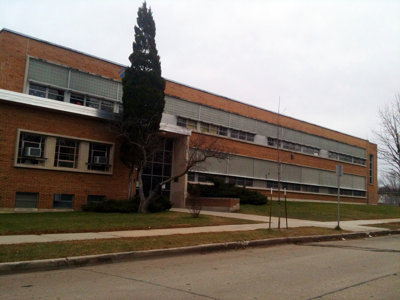If you’ve been watching this site, you’ve read about proposals by the community and by MPS to move the educational program that currently resides at 68th Street School, which will close at the end of this school year.
One plan that has gained traction in the West Side Cooper Park, Lenox Heights, Enderis Park and Kops Park neighborhoods was the idea – proposed initially by the 68th Street School community – to merge the program with nearby 81st Street School’s and give the school more of a neighborhood focus.
As became clear earlier this month at a public meeting held at Milwaukee School of Languages, the staff and parents at 81st Street School are not on board with the proposal, for a number of reasons, but in part because they feel they were left out of the crafting of the plan.
MPS is currently holding focus groups to gauge interest in the proposal, which will likely go before the board in March.
You’ve heard what others have said about the proposal before. Now, we asked 81st Street School teacher Joe Brusky – who spoke on behalf of the school community at the MSL meeting – what his school thinks of the plan and the current situation.
OnMilwaukee.com: Do you think there is room for compromise; to work together with 68th Street to hammer out a merger proposal that would make both schools happy?
Joe Brusky: I do not think there is room for compromise as long as any of our school’s current families are being displaced or we lose our middle school. Our parents, students, administration and staff are adamant on these points. I think a sour taste was left in our school community from the way the proposal was crafted solely by one side and although attempts were made to engage us, they were not as aggressive as they should have been.
Our community has also expressed that they felt belittled by the things said about our children’s test scores and program currently running at 81st Street School. We view our academics in a much more positive light than the writers of the proposal do and that perception has most likely suffocated any chance for future negotiation or compromise.
OMC: What are some of the points in their plan that 81st Street staff and parents don’t like?
JB: Not only are parents and staff of our school unhappy with the merger proposal, they feel as though the proposal is offensive for several reasons. First and foremost it displaces our middle school program, which parents have specifically chosen for that very reason since 81st Street School offers a K-8 environment. The North Side of Milwaukee has very limited options for parents in the K-8 model, unlike the South Side, which is K-8 rich. Parents have to bus their kids to 81st Street School because the school options are so few in their neighborhoods due to budget cuts of years past.
Several others have expressed that they feel like our children would be displaced in exchange for “neighborhood” children with no busing to the school. This language and intent in the proposal comes off to our parents as discriminatory. One of the parents who spoke at the community meeting in support of the proposal stated that she wouldn’t let her child go on the playground with the children on our playground, which intended or not, turned off many people in our community who began to perceive, whether correctly or incorrectly, that there are other underlying issues of privilege in play here.
There also is a sense among our community that the proposal seems to be very self-serving for the 68th Street School community. Even though they have stated that the proposal is a community effort it seems to be more the work of a small, committed and well-organized cadre of people who see this as a chance to save their school. The group’s ability to gather signatures and manufacture a feeling of community support is because the proposal they wrote up is more a pitch than anything close to realistic. Anyone who reads the proposal or who is given the fine points of the proposal would agree it sounds good but that doesn’t mean it is realistic and genuine.
In effect the group has been selling a proposal to the communities involved that is not even possible in an effort to manufacture more support for their proposal. At the recent community meeting our school’s parents were given notice of the meeting only two days prior to the meeting, and we still managed to get what seemed to be about 60 percent turnout to 40 percent for 68th Street School; I asked people involved with both sides to raise their hands at the meeting).
To turn out such a huge amount of parents on such a short time really showed that our parents have some concerns about this proposal. Their comments in the public speak-out portion of the community meeting also seemed to confirm this. There is also the overarching feeling that if 68th Street School was as concerned about the well being of 81st Street School’s community then why didn’t the community act before the 68th Street School was targeted for closure?
The 68th Street School would be bringing in completely unfunded units of K3 that would immediately put our school $1.2 million in the hole. This budgetary constraint is not fair to our other students in the building who would be forced to work with fewer resources.
Parents in our surrounding school community have decided to opt out of the Milwaukee Public Schools district in large numbers for voucher, charter and other surrounding public districts. There is no guarantee that those parents will not continue to do this after K5 instruction once they move into our building. This is a huge gamble for 81st Street School since the existing middle school students make up a large proportion of the K-8 school. Our middle school population is also a big user of after-school care, which the proposal mentions as a plus for 81st Street School.
We are concerned that the proposal does not account for SAGE funding – federal dollars used to reduce class size in grades K4-3 – which our school currently receives. It also does not account for two autism units that will be entering our community next year from a closed 65th Street School.
Specials – art, music, phy. ed – have been included in the proposal, however there is no reason to believe that these can be paid for. The proposal assumes that increased numbers to the enrollment from neighbors immediately re-enrolling their students at 81 Street will give the school extra money for specials. Our school is currently already running at 105 percent capacity and that isn’t even enough to reinstate specials for our current school year.
The 68th Street community has run the whole proposal process. The community meeting showed this clearly. They not only had the majority of time and speakers supporting their agenda, but they also were allowed to rebuttal anything said by the other side. This was one-sided and our community felt it and that had bred a suspicion as to the intentions of the group and why they feel like they have to sell this proposal.
OMC: Is there anything in the plan that you see as a plus for your school?
JB: Some of the positives we see are the fact that the school clearly does have a lot of active parents who care about the education of their children. The school also would be bringing in some nice resources, such as an excellent library. Some of our staff likes the idea of a year-round school and others do not. The community of 68th Street has also secured wonderful contacts for the arts in the surrounding community, which would be a great resource to tap into. Our community promotes a “college bound” atmosphere and 68th Street also seems to foster that kind of thinking.
OMC: I know you mentioned this a bit earlier, but what do you make of 68th Street community’s position that it had attempted to make inroads at 81st Street in terms of talking about a proposal but that it faced a wall erected by administration?
JB: We think this prolonged inability to contact and engage us was very unfortunate because it might have allowed for a healthy debate and collective cooperation by both staffs on writing up a proposal that could work for all sides. Unfortunately, that was not done and the process has been tainted, as most of our community thinks there are ill intentions with the creators of the merger proposal team.
OMC: What is the mood like at 81st Street? Would the school community there prefer to leave things as they are or do they think the idea of a merger — if done correctly — could be beneficial for the program?
JB: At this time, the staff at 81st Street School feels the existing school and programming is heading in the right direction and do not see a need for a merger. Our community was quite stressed with the entire process since we were left out for so long and this forced many people to spend a good deal of time reading and analyzing the proposal.
Once the proposal details were known and discussed our staff felt the meeting dates and times were announced with little time to prepare or make time. This stunted our ability as a community to be able to comment on the proposal in any sort of a meaningful way. I think now that our staff confirmed the proposal was not the direction we want to go in, we feel like we can focus more directly on educating our students.
OMC: Again, this is something you touched on earlier, but what’s your take on neighborhood opinion – based on petitions and neighborhood organizations – about making 81st Street a more neighborhood-focused school? Would the school benefit from having a much closer link to its surrounding communities even if that meant the population of the school might change?
JB: Although it would be great to have a neighborhood school within a close-knit community, unfortunately that is not the dynamic that exists today. Our parents should be able to choose a K-8 school not too far from home that meets their family’s needs. Many of our parents favor having all of their children in the same building and there are not many options in the area for this type of setting.
Again, it is unknown how many neighborhood families would really utilize the new proposed school and not leave prematurely, causing low enrollment. The current situation at 68th Street School has shown this trend. Our staff does not want 81st Street School to follow this pattern and face possible closure in the future if neighborhood families don’t stay in MPS.


 i evaluate to yes even if there's no image
i evaluate to yes even if there's no image  i evaluate to yes even if there's no image
i evaluate to yes even if there's no image  i evaluate to yes even if there's no image
i evaluate to yes even if there's no image  i evaluate to yes even if there's no image
i evaluate to yes even if there's no image  i evaluate to yes even if there's no image
i evaluate to yes even if there's no image  i evaluate to yes even if there's no image
i evaluate to yes even if there's no image 